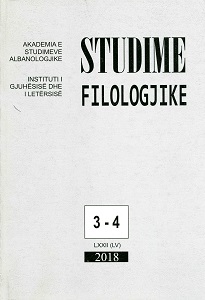Dukuri të ndërgjuhës tek shqipfolësi me italishten si gjuhë të dytë
The fenomen of interlanguage on Albanian language with Italian as a second language
Author(s): Valbona SinanajSubject(s): Language studies, Foreign languages learning, Phonetics / Phonology, Language acquisition
Published by: Qendra e Studimeve Albanologjike
Keywords: Albanian language; Italian language; Language acquisition; L2 (second language);
Summary/Abstract: Acquisitive linguistics describes stages of learning led to spontaneous or L2 (second language), and reaches through it to understand the principles and methods by which the mind processes and rebuilds a new language. Acquisitive linguistics describes and interprets the processes through which the speaker develops his competence language, also interprets and mistakes deviant forms used in various stages of L2 learning it, as manifestations creative student or speaker develops systematically, system rules new interlingua. Everyone uses language creatively and performances of his personal and is distinct from another person. During the process of learning a second language speaker describes an evolutionary phase called learning or Interlingua varieties, which differ from structured rules. Acquisitive studies, describe the process of L2 learning it, interpret deviant forms, present or errors that can be made in different learning stages, the first of these errors not as a negative indicator of competence, but as a creative manifestation during which the student develops in a systematic way the rules of the new language. The comparative analyzes and the differences between the Italian language and Albanian language are complex. It is reflected in the conscience of emigrants and Albanian scholars who are under the pressure of both different languages and cultures, in their efforts to be expressed into Italian to be integrated and to survive in the Italian society. Each language contains some linguistic units that reflect the social features of the speaker, the listener or of the relations between them. As a consequence a linguistic act that contains these units informs the listener for the way the speaker consider these features and their incorrect use represents an infringement of the linguistic norms. The language can also reflect the social relations between the speaker and the listener, in particular the power and the solidarity manifested in these relations. The power does not demand the explanations, but the solidarity is linked with the social distance of the people: how much common experience they have and as they have features in common (belief, sex, age, country of origin, race, labor, interest) to what extent are likely to live together. These conclusions convinced us that if we want to learn or to use a foreign language is necessary the acquisition of sounds for mutual interfering of them, placing clearly in the phonematic systems of each language. Each language has its sounds, and those that look identically are always approximate, and in order to learn a foreign language we have to recognize and to know the new phonematical system.
Journal: Studime Filologjike
- Issue Year: 2018
- Issue No: 03-04
- Page Range: 147-161
- Page Count: 15
- Language: Albanian

